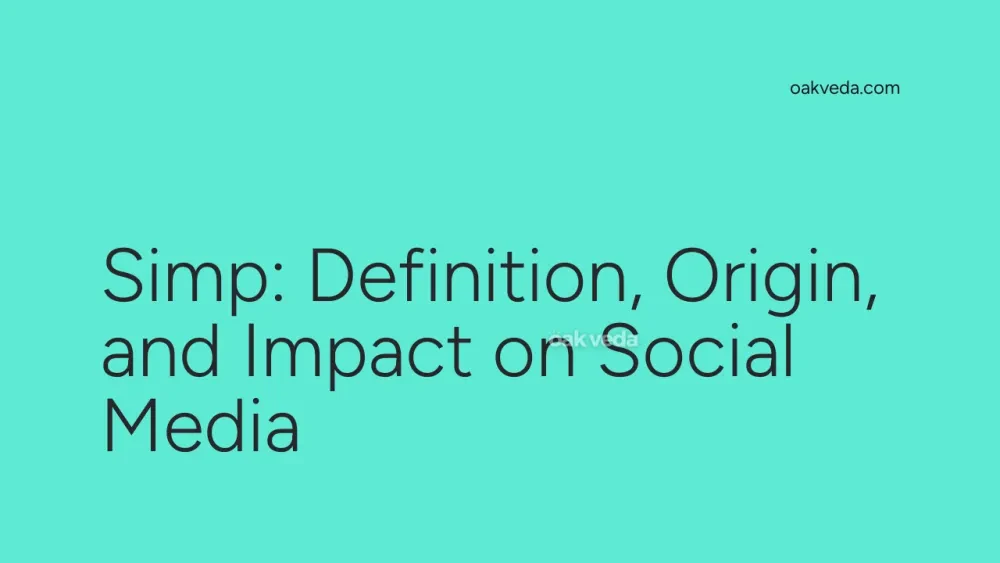
What is Simp?
"Simp" is a slang term that has gained significant traction in social media circles, particularly among younger users. It's used to describe someone who is perceived as overly submissive, attentive, or desperate for attention or affection from another person, typically without receiving any reciprocation. The term often carries a negative connotation and is frequently used to criticize or mock individuals who are seen as putting too much effort into impressing someone who doesn't return their interest.
Origin and Development of Simp
The term "simp" has an interesting evolution. While its exact origins are debated, it's believed to have roots in African American Vernacular English (AAVE) dating back to the early 2000s. Initially, it was used as a shortened form of "simpleton," describing someone foolish or silly. However, the meaning has shifted significantly over time.
The current usage of "simp" gained momentum in the late 2010s and exploded in popularity in early 2020, largely due to its widespread use on social media platforms like TikTok, Twitter, and Instagram. Memes, jokes, and hashtags featuring the term contributed to its rapid spread across the internet.
How Simp Works in Social Media Context
In the social media landscape, "simp" is often used in the following ways:
- Commentary: Users might label someone a "simp" in comment sections or replies when they perceive excessive flattery or attention-seeking behavior.
- Self-deprecating humor: Some individuals jokingly refer to themselves as "simps" when admitting to having a crush or showing affection.
- Memes and content: "Simp" has become a popular subject for memes, videos, and other shareable content, often poking fun at stereotypical "simp" behavior.
Types or Variations of Simp
While "simp" is the primary term, several variations and related concepts have emerged:
- Simping: The act of behaving like a simp.
- Simp Nation: A humorous term for the collective group of people considered simps.
- Anti-Simp: Someone who actively avoids behaviors associated with being a simp.
- Super Simp: An exaggerated version, describing someone who goes to extreme lengths in their simping behavior.
Popular Examples of Simp in Social Media
The term "simp" has been used in various viral moments and trends on social media:
- The "Simp Nation" TikTok trend: Users create videos showcasing scenarios where they or others might be considered simps.
- Twitter hashtags: #SimpCheck and #SimpNation have trended, with users sharing stories or memes related to simping.
- YouTube content: Many creators have made videos explaining, debating, or humorously exploring the concept of simps.
Impact of Simp on Social Media Culture
The rise of "simp" has had several notable effects on social media culture:
- Changing relationship dynamics: The term has influenced how people perceive and discuss romantic pursuits and interactions online.
- Gender discourse: "Simp" has sparked debates about gender roles and expectations in modern relationships.
- Language evolution: It demonstrates how quickly new slang can spread and evolve in the digital age.
- Meme culture: "Simp" has become a significant part of internet meme culture, inspiring countless jokes and content.
Controversies Surrounding Simp
The term "simp" has not been without controversy:
- Toxic masculinity: Critics argue that the term reinforces harmful stereotypes about masculinity and discourages men from showing genuine affection or respect.
- Misogyny: Some view the term as inherently misogynistic, as it's often used to shame men for treating women with kindness or respect.
- Bullying concerns: There are worries that the term is used to bully or shame individuals, particularly young people exploring relationships.
How Brands and Influencers Use Simp
Despite its controversial nature, some brands and influencers have incorporated "simp" into their social media strategies:
- Engagement bait: Some use the term to provoke reactions and increase engagement on their posts.
- Product marketing: Certain brands have created "anti-simp" or "simp-proof" products as humorous marketing campaigns.
- Content creation: Influencers often create content around the concept of simping, either embracing or rejecting the label for entertainment.
Future Trends Related to Simp
As with many internet slang terms, the future of "simp" is uncertain. However, some trends are emerging:
- Reclamation: Some users are attempting to reclaim the term, using it positively to describe genuine care and affection.
- Evolving meaning: The term's definition may continue to shift as social attitudes change.
- Potential decline: Like many viral terms, "simp" may eventually fade from popular usage as new slang emerges.
FAQs about Simp
-
Is being called a simp always negative? While often used negatively, some people use it jokingly or even as a badge of honor for being attentive or caring.
-
Can women be simps? Yes, although the term is more commonly applied to men, it can be used for anyone regardless of gender.
-
How can I avoid being labeled a simp? Focus on maintaining healthy, balanced relationships and avoid excessive or one-sided displays of affection or attention.
-
Is the term simp here to stay? While currently popular, like most slang terms, its usage may decline over time as language and social media trends evolve.
Understanding terms like "simp" is crucial for navigating modern social media culture. While it's important to be aware of these trends, it's equally important to approach them critically and consider their broader implications on social interactions and relationships.
You may be interested in:

